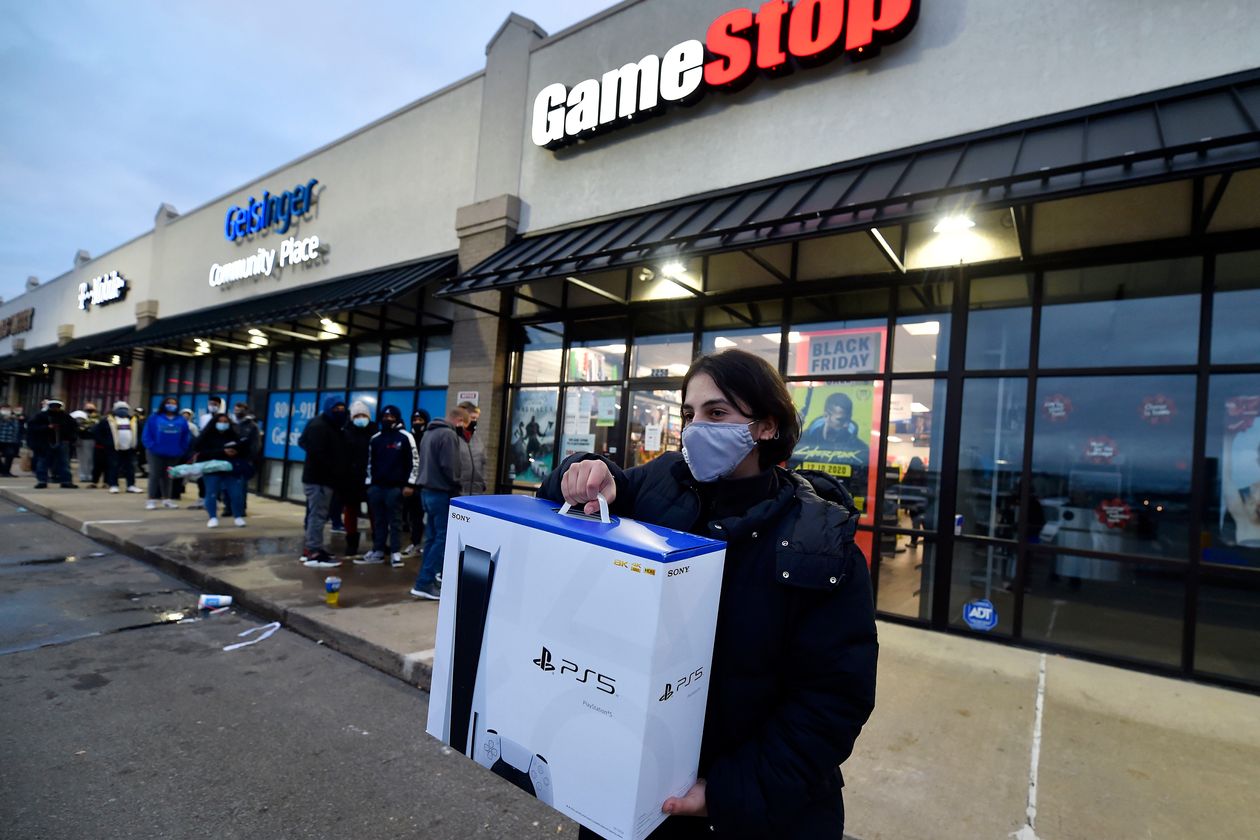GameStop Is A Bubble In Its Purest Form
It is tempting to see GameStop’s soaring stock as merely the result of clownish behaviour in a chat room. That would be a mistake.
GameStop is the platonic ideal of a stock bubble.
A combination of easy money, a real improvement in the company’s prospects, technical support from a short squeeze and a mad rush to get rich or die trying pushed stock in the retailer up 64-fold from late August to Wednesday’s close. Anyone who has held on for 10 days made gains of more than 10 times their money.
It is tempting to see GameStop as merely clownish behaviour in a chat room having some amusing effects on a stock few care about. That would be a mistake.
Sure, the wildly popular Reddit group Wall Street Bets—slogan: like 4chan found a Bloomberg terminal—is full of childish chat. Several users report that they have bet their parents’ pension fund on GameStop or that the boss’s daughter has bought in. There are plenty of calls for the stock to go to $1000 or more (it started the year at $18.84).
But GameStop’s soaring stock—and similar moves in BlackBerry, Nokia and others—is a bubble in microcosm, with lessons for those of us worrying about froth elsewhere in the market.
GameStop’s rise started with some genuine good news, just as bubbles always do. Ryan Cohen, who built up and sold online pet-food retailer Chewy, started building what is now a 13% stake for his RC Ventures in GameStop last year. He pushed for the staid mall-based seller of videogames to improve its internet sales. This month he joined the board.
Mr Cohen’s arrival means GameStop at least has a chance of joining the 21st century. From the first disclosure of his stock purchases in August up to the end of November the shares tripled, helped too by the improved prospects for the vaccine-driven reopening of the economy.
Along the way, some private investors latched on to the stock, helping its rise, and it became an item of discussion on Wall Street Bets, or r/WSB as it’s known.
This month the stock moved into the pure speculative phase, producing several daily jumps of 50% or more, and fundamentals were abandoned. Many cheerleaders on r/WSB stopped even making the pretense of arguments about Mr Cohen’s chances of turning the company around. Instead, there were two justifications for buying: wanting to get in on the price action to avoid being labelled, in the abusive parlance of the forum, a “retard” who missed gigantic profits, and the self-fulfilling prospect of hurting the large numbers of short-sellers.
As the late economist Charles Kindleberger put it: “There is nothing as disturbing to one’s well-being and judgment as to see a friend get rich. Unless it is to see a non-friend get rich.”
The scale of trading in GameStop shares is as extraordinary as the daily gains in price, suggesting widespread disturbance to people’s judgment. On Tuesday, $22 billion of shares changed hands, more than in Apple, the world’s largest company, and double GameStop’s market value. Adam Smith, the founder of economics, called speculative manias “overtrading,” and this is what they look like.
The hope of getting rich is only part of what’s inflating the bubble. Kindleberger argued that speculative manias needed innovative sources of financing, and the private traders on r/WSB have one: the shift last year to make trading in options free on Robinhood and several other platforms.
Options, like other derivatives, allow traders to use implied leverage to boost their bets, similar to borrowing money. In the same way that Japan’s bubble in the 1980s was fueled by cheap mortgages, and low Federal Reserve rates combined with collateralised debt obligations to support the housing bubble of the 2000s, the bubble in GameStop is aided by an increase in the money supply of private stock traders. Stimulus checks from the government can’t hurt, either.
Bubbles also frequently have support from technical factors that prevent the asset from being priced correctly. In the late 1990s, many dot-coms had a small float available, and none for short-sellers, making it hard or impossible for those who doubted the story to have their views expressed in the share price.
In GameStop, there are plenty of short-sellers, but they are making things even worse. The stock is caught in a vicious short squeeze. Short sellers had borrowed and sold more than 100% of the stock outstanding, as some was borrowed again. As the price rose, at least some of the hedge funds bought back shares to prevent further losses, so pushing the price up even further.
The most obvious parallel here is to K-Tel, the TV retailer of compilation tapes and the Veg-o-matic food processor, among other things. It announced in 1998 that it was moving online, prompting a jump in the shares that turned into an extraordinary short squeeze. K-Tel’s appropriately named public relations representative, Coffin Communications, gave this wonderful justification to the Washington Post: “Which do you think has more likelihood of success, a pure start-up that has never sold a product, or one like K-Tel that has been in business for 35 years?”
It turned out the answer was a pure startup, and K-Tel’s shares collapsed—but not before they had soared from $3.34 to more than $35 in under a month.
The difference with GameStop is that the r/WSB mob is actively engineering a short squeeze, discussing the pain they hoped to inflict on the short sellers and encouraging buyers not to cash in their profits.
Because there are so many shares that need to be repurchased by short-sellers, this offers an exit route for those who sell. But not everyone can do this, and those who are left holding the stock when demand eventually evaporates will watch the price plummet as it reverts back to something closer to what is justified by the company’s profit potential, just as K-Tel did.
Warren Buffett attributed to his mentor, Ben Graham, the line that “in the short run, the market is a voting machine—reflecting a voter-registration test that requires only money, not intelligence or emotional stability—but in the long run, the market is a weighing machine.”
The absence of emotional stability on r/WSB is obvious and has worked out beautifully for buyers of GameStop so far. But when the stock is weighed, many will be found wanting, as they always are in bubbles.
 Copyright 2020, Dow Jones & Company, Inc. All Rights Reserved Worldwide. LEARN MORE
Copyright 2020, Dow Jones & Company, Inc. All Rights Reserved Worldwide. LEARN MORE
This stylish family home combines a classic palette and finishes with a flexible floorplan
Just 55 minutes from Sydney, make this your creative getaway located in the majestic Hawkesbury region.
Continued stagflation and cost of living pressures are causing couples to think twice about starting a family, new data has revealed, with long term impacts expected
Australia is in the midst of a ‘baby recession’ with preliminary estimates showing the number of births in 2023 fell by more than four percent to the lowest level since 2006, according to KPMG. The consultancy firm says this reflects the impact of cost-of-living pressures on the feasibility of younger Australians starting a family.
KPMG estimates that 289,100 babies were born in 2023. This compares to 300,684 babies in 2022 and 309,996 in 2021, according to the Australian Bureau of Statistics (ABS). KPMG urban economist Terry Rawnsley said weak economic growth often leads to a reduced number of births. In 2023, ABS data shows gross domestic product (GDP) fell to 1.5 percent. Despite the population growing by 2.5 percent in 2023, GDP on a per capita basis went into negative territory, down one percent over the 12 months.
“Birth rates provide insight into long-term population growth as well as the current confidence of Australian families,” said Mr Rawnsley. “We haven’t seen such a sharp drop in births in Australia since the period of economic stagflation in the 1970s, which coincided with the initial widespread adoption of the contraceptive pill.”
Mr Rawnsley said many Australian couples delayed starting a family while the pandemic played out in 2020. The number of births fell from 305,832 in 2019 to 294,369 in 2020. Then in 2021, strong employment and vast amounts of stimulus money, along with high household savings due to lockdowns, gave couples better financial means to have a baby. This led to a rebound in births.
However, the re-opening of the global economy in 2022 led to soaring inflation. By the start of 2023, the Australian consumer price index (CPI) had risen to its highest level since 1990 at 7.8 percent per annum. By that stage, the Reserve Bank had already commenced an aggressive rate-hiking strategy to fight inflation and had raised the cash rate every month between May and December 2022.
Five more rate hikes during 2023 put further pressure on couples with mortgages and put the brakes on family formation. “This combination of the pandemic and rapid economic changes explains the spike and subsequent sharp decline in birth rates we have observed over the past four years,” Mr Rawnsley said.
The impact of high costs of living on couples’ decision to have a baby is highlighted in births data for the capital cities. KPMG estimates there were 60,860 births in Sydney in 2023, down 8.6 percent from 2019. There were 56,270 births in Melbourne, down 7.3 percent. In Perth, there were 25,020 births, down 6 percent, while in Brisbane there were 30,250 births, down 4.3 percent. Canberra was the only capital city where there was no fall in the number of births in 2023 compared to 2019.
“CPI growth in Canberra has been slightly subdued compared to that in other major cities, and the economic outlook has remained strong,” Mr Rawnsley said. “This means families have not been hurting as much as those in other capital cities, and in turn, we’ve seen a stabilisation of births in the ACT.”
This stylish family home combines a classic palette and finishes with a flexible floorplan
Just 55 minutes from Sydney, make this your creative getaway located in the majestic Hawkesbury region.






















